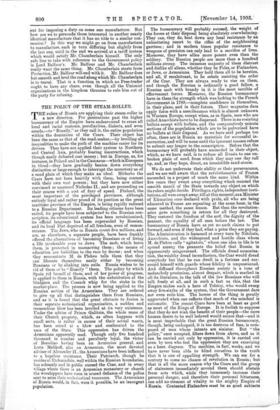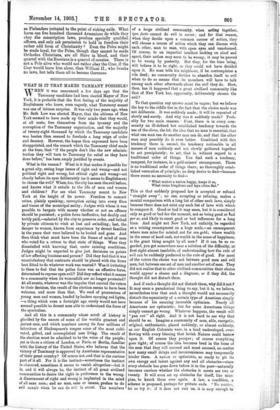THE POLICY OF THE STEAM-ROLLER. T HE rulers of Russia are
applying their steam-roller in a new direction. For generations past the higher bureaucracy of the Empire have endeavoured to erase all local and racial customs, peculiarities, dialects, and even creeds,—to " Russify," as they call it, the entire population within the dominions of the Czars. Their object has been the same as that of the road-maker,—by levelling all inequalities to make the path of the machine easier for its drivers. They have not applied their system to Northern and Central Asia, probably fearing insurrections, which though easily defeated cost money ; but in Europe, as, for instance, in Poland and in the Caucasus—which is European in blood—they have gradually beaten down everything distinctive or large enough to interrupt the monotony as of a sand plain of which they make an ideal. Hitherto the Czars have not been heartily with them, being content with their own vast powers ; but they have now either convinced or mastered Nicholas II., and are proceeding on their course with a sort of fury of speed. Finland, the most important of the privileged provinces, although entirely loyal and rather proud of its position as the great maritime province of the Empire, is being rapidly reduced to a Russian Department. Its leading citizens have been exiled, its people have been subjected to the Russian con- scription, its educational system has been revolutionised, its official language has been superseded by Russian, and its local Diet deprived of all freedom, even of remon- strance. The Jews, who in Russia count five millions, and are, as elsewhere, a separate people, have been frankly offered the alternatives of becoming Russians or of living a life intolerable even to Jews. The mob, which hates them, is protected in massacring them ; the means of education are forbidden to the race by decree ; and when they remonstrate M. de Plehve tells them that they can liberate themselves easily either by becoming Russians or by slinking into exile. Russia wishes to be rid of them or to " Russify " them. The policy by which Spain rid herself of them, and of her power of progress, is applied to them in Russia, with the .substitution of the bludgeon and the Cossack whip for the stake in the market-place. The process is now being applied to the Russian section of the Armenians. They are ordered to give up all that distinguishes them from Russians, and as it is found that the great obstacle to fusion is their separate ecclesiastical organisation, a sudden and tremendous blow has been levelled at its very existence. Under the advice of Prince Galitzin, the whole mass of their Church .property, which, as often happens with small sects, is rather in excess of their actual wants, has been seized at a blow and confiscated to the uses of the State. This oppression has driven the Armenians apparently mad. Though only five hundred thousand in number and peculiarly loyal, the victor of Borodino having been an Armenian general, and Loris Melikoff, also an Armenian, the most devoted adviser of Alexander II., the Armenians have been inflamed to a hopeless resistance. Their Patriarch, though he resides at Etchmiadzin, well within the Russian boundaries, has solemnly and hi public cursed the Czar, and in every village where there is an Armenian monastery or church the worshippers have risen in "armed defiance of the police sent to seize their ecclesiastical treasures. The Armenians of Russia would, in fact, were it possible, be an insurgent population. The bureaucracy will probably succeed, the weight of the forces at their disposal being absolutely overwhelming. They can, they do, beat down any local resistance by an unhesitating resort to the rifles of the neighbouring garrison ; and in modern times popular resistance to weapons of precision can only lead to a sacrifice of lives. Moreover, they have allies more potent even than the soldiery. The Russian people are more than a hundred millions strong. The immense majority of them distrust and dislike all aliens, whether they be Poles, or Finlanders, or Jews, or Armenians. They hold them all to be heretics, and all, if recalcitrant, to be rebels resisting the order of the Czar. They are always ready to rise on them, and though the Russian is ordinarily a good fellow, a Russian mob with brandy in it is the most terrible of effervescent forces. Moreover, the Russian bureaucracy have in them the strength which was lacking to the French Government in 1789,—complete confidence in themselves, in their plans, and in their future. Their magnates dare apply force with a mercilessness which is almost unknown in Western Europe, except when, as in Spain, men who are called Anarchists have to be dispersed. There is no resisting bullets except with bullets, and the comparatively minute sections of the population which are to be pulverised have no bullets at their disposal. As we have said perhaps too often, there are in Russia no materials for successful in- surrection, and will be none until the ignorant masses refuse to submit any longer to the conscription. Before that the bureaucracy will probably have succeeded in their object, which, as we have said, is to reduce all Russia to one un- broken plain of sand, from which they may one day call up, and, as they hope, direct, an irresistible sand-storm.
We do not underrate their ability or their perseverance, and we are well aware that the revolutionaries of France succeeded in a project of much the same kind. Within five years they swept away everything which resisted the smooth march of the State towards any object on which its rulers might decide. Privileges, rights, independent insti- tutions, all were swept away, till at this moment, as a Minister of Education once declared with pride, all who are being educated in France are repeating at the same hour, in the: same method, the same lesson. But then the revolution- aries gave something in return for all they destroyed. They restored the freedom of the serf, the dignity of the peasant, the equality of all men before the law. The bureaucracy of Russia have as yet 'no such claims to put forward, and even if they had, what a price they are paying.. The Administration is harassed at every turn by Nihilists, Anarchists, and the widespread and hostile class whom M. de Plehve calls " agitators," whose one idea in life is to spread among the peasants the belief that Russia is oppressively misgoverned. The officials dread assassina- tion, the wealthy dread incendiarism, the Czar would dread everybody but that he can dwell in a fortress and sur- round himself with guards whose fidelity is unquestioned. And diffused throughout Russian society is a tone of melancholy pessimism, almost despair, which is marked in all its literature, in the talk of the few Russians who will talk freely at all, and in such a fact as this, that the Empire makes such a hero of Tolstoy, who would sweep away five-sixths of the system, that the Government dare not even exile him. The horror of the thing is greatly aggravated when one reflects that much of the mischief is automatic. The recent Czars have been at least as good as most of the Kings of Europe. It is foolish to suppose. that they do not wish the benefit of their people—the mere human desire to be well beloved would secure that—and it is most improbable that the great Russian bureaucracy, though, being underpaid, it. is too desirous of fees, is coin-, posed of men whose intents are sinister. But " the policy," once accepted, filters down from above, and as it can be carried out only by oppression, it is carried out even by men who feel the oppression they are exercising as a keen disgrace. The machine, in fact, works, and we have never been able to blind ourselves to the truth that it is one of appalling strength. We can see for a century to come no chance of revolution in Russia; but that is all the more reason why the Czars and the group of statesmen immediately around them should abstain from acts which, while they immensely increase their personal danger, and therefore their personal bitterness, can add no element of vitality to the mighty Empire of Russia. Contented Finlanders must be as good subjects
as Philanders irritated to the point of risking exile. What harm can five hundred thousand Armenians do while they obey the conscription laws, produce specially qualified officers, and only ask permission to hold in freedom their rather odd form of Christianity ? Even the Poles might be made loyal, for the Poles, though they cannot be made Orthodox Christians, are all Slays in blood, and their quarrel with the Russians is a quarrel of cousins. There is not a Pole alive who would not rather obey the Czar, if the Czar would leave him alone, than William II., who breaks no laws, but tells them all to become Germans.















































 Previous page
Previous page